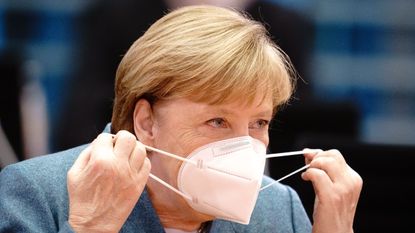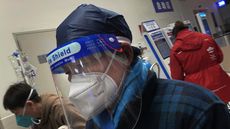European countries split over use of medical-grade face masks
Germany and Austria mandate use of expensive FFP2 masks while WHO backs fabric coverings

The debate over face masks to protect against Covid has taken a new twist as some European nations make medical-grade masks compulsory while the World Health Organization (WHO) continues to support the use of fabric versions.
The German state of Bavaria and Austria have “tightened rules” to mandate that FFP2 masks must be worn inside shops and on public transport, Politico reports. And France has “recommended against wearing some homemade masks that don’t meet certain standards”.
“But many other European countries, as well as the WHO, are sticking to their current advice,” the news site adds.
Subscribe to The Week
Escape your echo chamber. Get the facts behind the news, plus analysis from multiple perspectives.

Sign up for The Week's Free Newsletters
From our morning news briefing to a weekly Good News Newsletter, get the best of The Week delivered directly to your inbox.
From our morning news briefing to a weekly Good News Newsletter, get the best of The Week delivered directly to your inbox.
The UN health agency’s technical lead for Covid-19, Maria Van Kerkhove, insists that “limited and inconsistent scientific evidence” on masks in community settings is grounds to retain the existing guidance, rather than recommending higher-grade masks.
Explaining the difference between the various kinds of face coverings, Lawrence Young, professor of molecular oncology at Warwick Medical School, said that while “fabric masks, or blue and white surgical masks, stop you breathing out infectious virus onto other people”, FFP2 masks are designed to “protect the wearer from breathing in infectious virus shed in aerosols from infected individuals”.
However, Dr Simon Kolstoe, a senior lecturer in evidence-based healthcare at the University of Portsmouth, told Euronews that although FFP2 masks are used in hospitals and laboratories, it would be “unreasonable” to expect them to be as effective when used by members of the public who lack the “training” that health professionals will have received.
“Anyone who’s worked in those sorts of environments knows that it’s not just a case of slapping a mask on,” Kolstoe said. “There’s training as well, wearing gloves, wearing the right equipment, washing your hands, an appropriate way of handling things.”
Create an account with the same email registered to your subscription to unlock access.
Sign up for Today's Best Articles in your inbox
A free daily email with the biggest news stories of the day – and the best features from TheWeek.com
Chas Newkey-Burden has been part of The Week Digital team for more than a decade and a journalist for 25 years, starting out on the irreverent football weekly 90 Minutes, before moving to lifestyle magazines Loaded and Attitude. He was a columnist for The Big Issue and landed a world exclusive with David Beckham that became the weekly magazine’s bestselling issue. He now writes regularly for The Guardian, The Telegraph, The Independent, Metro, FourFourTwo and the i new site. He is also the author of a number of non-fiction books.
-
 'Good riddance to the televised presidential debate'
'Good riddance to the televised presidential debate'Instant Opinion Opinion, comment and editorials of the day
By Harold Maass, The Week US Published
-
 Caitlin Clark the No. 1 pick in bullish WNBA Draft
Caitlin Clark the No. 1 pick in bullish WNBA DraftSpeed Read As expected, she went to the Indiana Fever
By Peter Weber, The Week US Published
-
 Today's political cartoons - April 16, 2024
Today's political cartoons - April 16, 2024Cartoons Tuesday's cartoons - sleepyhead, little people, and more
By The Week US Published
-
 Covid four years on: have we got over the pandemic?
Covid four years on: have we got over the pandemic?Today's Big Question Brits suffering from both lockdown nostalgia and collective trauma that refuses to go away
By Chas Newkey-Burden, The Week UK Published
-
 The hollow classroom
The hollow classroomOpinion Remote school let kids down. It will take much more than extra tutoring for kids to recover.
By Mark Gimein Published
-
 Excess screen time is making children only see what is in front of them
Excess screen time is making children only see what is in front of themUnder the radar The future is looking blurry. And very nearsighted.
By Devika Rao, The Week US Published
-
 Covid-19: what to know about UK's new Juno and Pirola variants
Covid-19: what to know about UK's new Juno and Pirola variantsin depth Rapidly spreading new JN.1 strain is 'yet another reminder that the pandemic is far from over'
By Arion McNicoll, The Week UK Published
-
 Long-term respiratory illness is here to stay
Long-term respiratory illness is here to stayThe Explainer Covid is not the only disease with a long version
By Devika Rao, The Week US Published
-
 2023: the year of the loneliness epidemic
2023: the year of the loneliness epidemicthe explainer Loneliness isn't a new problem. But fighting it became a global health priority in 2023.
By Theara Coleman, The Week US Published
-
 Covid inquiry: the most important questions for Boris Johnson
Covid inquiry: the most important questions for Boris JohnsonTalking Point Former PM has faced weeks of heavy criticism from former colleagues at the public hearing
By The Week Staff Published
-
 China's pneumonia cases: should we be worried?
China's pneumonia cases: should we be worried?The Explainer Experts warn against pushing 'pandemic panic button' following outbreak of respiratory illness
By Keumars Afifi-Sabet, The Week UK Published